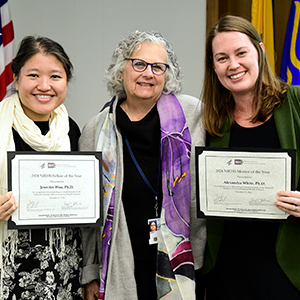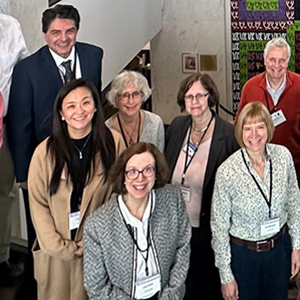Six research programs across the National Institutes of Health (NIH) recently received funding designed to advance climate-related research activities. The Intramural Targeted Climate Change & Health (ITCCH) funding program is a $2.1 million collaboration between NIEHS and the NIH Office of Intramural Research.
The two-year awards will provide up to $200,000 annually to support research activities for NIH intramural investigators focused on basic and applied research on the health effects of climate change.

“This initiative is a way for intramural researchers to use their research expertise to enrich climate change research,” said NIEHS Assistant Scientific Director Steven Tuyishime, Ph.D. “We’re hoping this funding will be fruitful for awardees’ research programs and will show others that you can apply your skills to climate change research.”
A total of 17 applications were submitted, with 13 institutes and centers represented. Applications were evaluated by a special emphasis panel for their expected contribution to understanding the health effects of climate change, including the innovation, significance, impact, and feasibility of the proposal. The top six applications received funding.
Heat exposure and health
An NIEHS research team received one of the six awards. Dale Sandler, Ph.D., NIEHS Epidemiology Branch chief and senior investigator, will lead an effort to improve understanding of the biological response to heat and subsequent heat-related illness and death. Sandler’s team will examine the relationship between heat exposure and blood DNA methylation, which is an epigenetic change. Epigenetic changes, which sometimes act as on-off switches that change how a gene functions, are often driven by environmental influences.

“The ITCCH program allowed us to think outside the box and propose research bridging different disciplines,” Sandler said. “The most exciting aspects of our project are the parallel analyses to determine translatability of the heat-related epigenetic changes between species and the opportunity to collaborate across NIH and with the Environmental Protection Agency [EPA].”
Collaborators include Kaitlyn Lawrence, Ph.D., Lenore Launer, Ph.D., Elizabeth Martin, Ph.D., and Paul Wade, Ph.D., of the NIH; and Urmila Kodavanti, Ph.D., and Thomas Jackson, Ph.D., of the EPA.
Using an innovative paired experimental study and epidemiological analysis incorporating novel heat wave exposure metrics, the researchers will identify pathways related to heat stress that are shared between humans and mice. Such comparisons will help identify epigenetic pathways involved in heat response, metabolic dysregulation, and disease development.
Sandler and team aim to identify early epigenetic changes associated with extreme heat that may serve as markers of exposure response and disease development. Future studies may include a partnership with National Institute of Aging (NIA) researchers to assess brain-related heat effects.
An NIH-wide effort
Three of the six funded projects will respectively explore how climate change affects reproductive health, pregnancy, and birth outcomes (Eunice Shriver National Institute of Child Health and Development); cardiovascular aging (NIA); and lung cancer risk (National Cancer Institute). In addition, the effects of wildfire smoke exposure on the epigenome and health will be evaluated in a multi-ethnic cohort (National Institute of Arthritis and Musculoskeletal and Skin Diseases). Emily Ricotta, Ph.D., a National Institute of Allergy and Infectious Diseases independent research scholar, will conduct an analysis of data management capacity in regions with high infectious disease spillover risk.
“The ITCCH program offers an outstanding opportunity to stimulate trans-NIH collaborations in the climate change and health area across the entire NIH intramural research program,” said NIEHS Scientific Director Darryl C. Zeldin, M.D. “Increasing mechanistic, clinical-translational, and population research on health effects of climate change, which is perhaps the most important topic that we face in the world today, is a very high priority for all of us.”
(Caroline Stetler is Editor-in-Chief of the Environmental Factor, produced monthly by the NIEHS Office of Communications and Public Liaison.)









